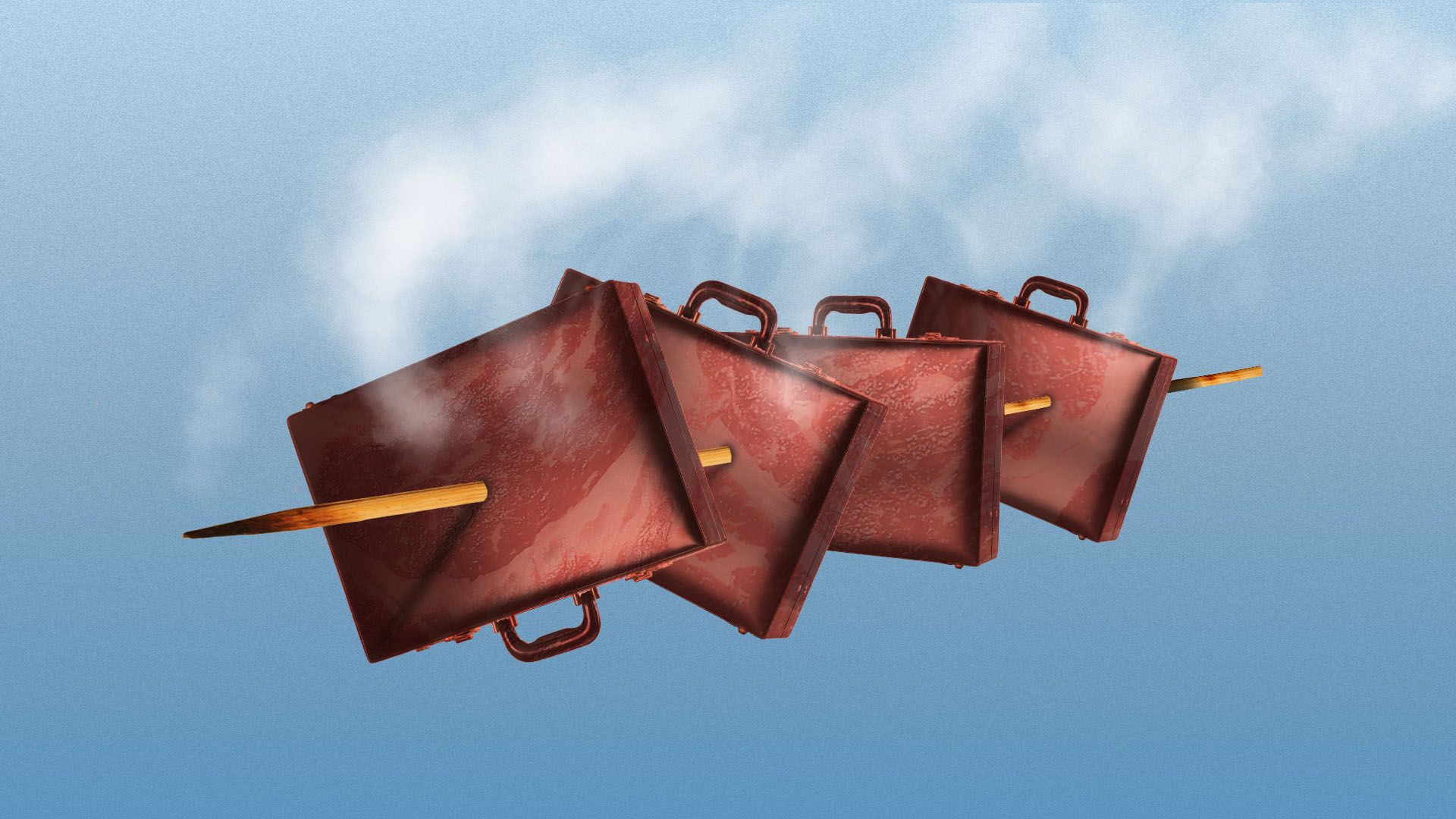Jackpot for liability lawyers
Add Axios as your preferred source to
see more of our stories on Google.

Illustration: Sarah Grillo/Axios
President Trump’s order to reopen meat processing plants, despite the fact that they're coronavirus hot spots, raises a tangle of liability issues that could keep courts and trial lawyers busy for years.
Why it matters: The scrap over meat plants — which is just heating up — may be a microcosm of the ones other businesses will face once commerce opens up more broadly.
What they're saying: As corporate responsibility for workers' and customers' COVID-19 infections turns into a political and financial flashpoint, the beneficiaries will likely be trial lawyers, bringing torts of all kinds.
- "I envision that you are going to see a spike in litigation," Eric Swan, a tort litigation attorney at Lathrop GPM, tells Axios. "You're going to see personal injury claims from consumers against businesses — you're already seeing this a little bit with employees against employers."
- He cited a wrongful death suit against Walmart in Illinois brought by the family of an employee who died of COVID-19. The family said the company didn't do enough to protect him.
Driving the news: Meat processing workers, many of them low-income immigrants and minorities, are being recalled to plants where thousands have been sickened. If the administration has its way, their employers will enjoy liability protection, shielding them from lawsuits brought by workers or their family members who contracted COVID-19.
But the issue is fraught. On one side are groups like the U.S. Chamber of Commerce, which sent a letter to Trump on Tuesday pushing him to curb the amount of liability businesses could face.
- The letter warned against a scenario where "government bureaucrats enforcing a rule book of regulations" could "issue fines when they find a sneeze guard out of place."
- The letter was delivered to a receptive audience: Trump and his chief economic advisor, Larry Kudlow, are said to be in favor of a "liability shield" that would "prevent businesses from being sued by customers who contract the coronavirus," per the Washington Post.
On the other side are consumer advocates and unions, some of which sent a letter to Congress saying, "legal liability is one of the most powerful incentives we have to ensure that businesses operate safely."
- Democratic Sen. Mazie Hirono of Hawaii tweeted: "Forcing meat processing plants to stay open without adequate worker protections while shielding owners from liability just for @realDonaldTrump's personal, political benefit demonstrates a callous disregard for human life."
Details: Lawyers say the meat producers being forced to reopen plants — like Tyson Foods, Conagra, Smithfield Foods, JBS and Cargill — could face a range of legal challenges if their workers get sick or if they're unable to honor contracts with suppliers and customers.
- "What if I get sick at work, and I can show that my employer didn't take enough steps to prevent that colleague next to me from from coming in?" Omer Tene of the International Association of Privacy Professionals tells Axios.
- A "force majeure" clause in a contract that frees both parties from liability in the event of extraordinary circumstances could suddenly be nullified, leaving the meat company with contracts to fill and cattle it's obliged to buy, David Domina, a trial practice lawyer in Omaha, tells Axios.
- And a big percentage of workers could call in sick, leaving the plant unable to function at full capacity.
- "The overwhelming majority of the workforce could have worker's comp claims," Domina says.
Even before the president's order on Tuesday, workers at a Smithfield Foods pork processing plant in Milan, Mo. — which has not closed — sued the company, seeking an injunction until more safety measures are put in place.
- An anonymous plaintiff who works at the plant wrote an impassioned article in the Washington Post saying, "managers never blatantly asked me to risk my life just by showing up — until this pandemic."
The bottom line: No business will be immune from the possibility of liability lawsuits as the nation opens up again.
